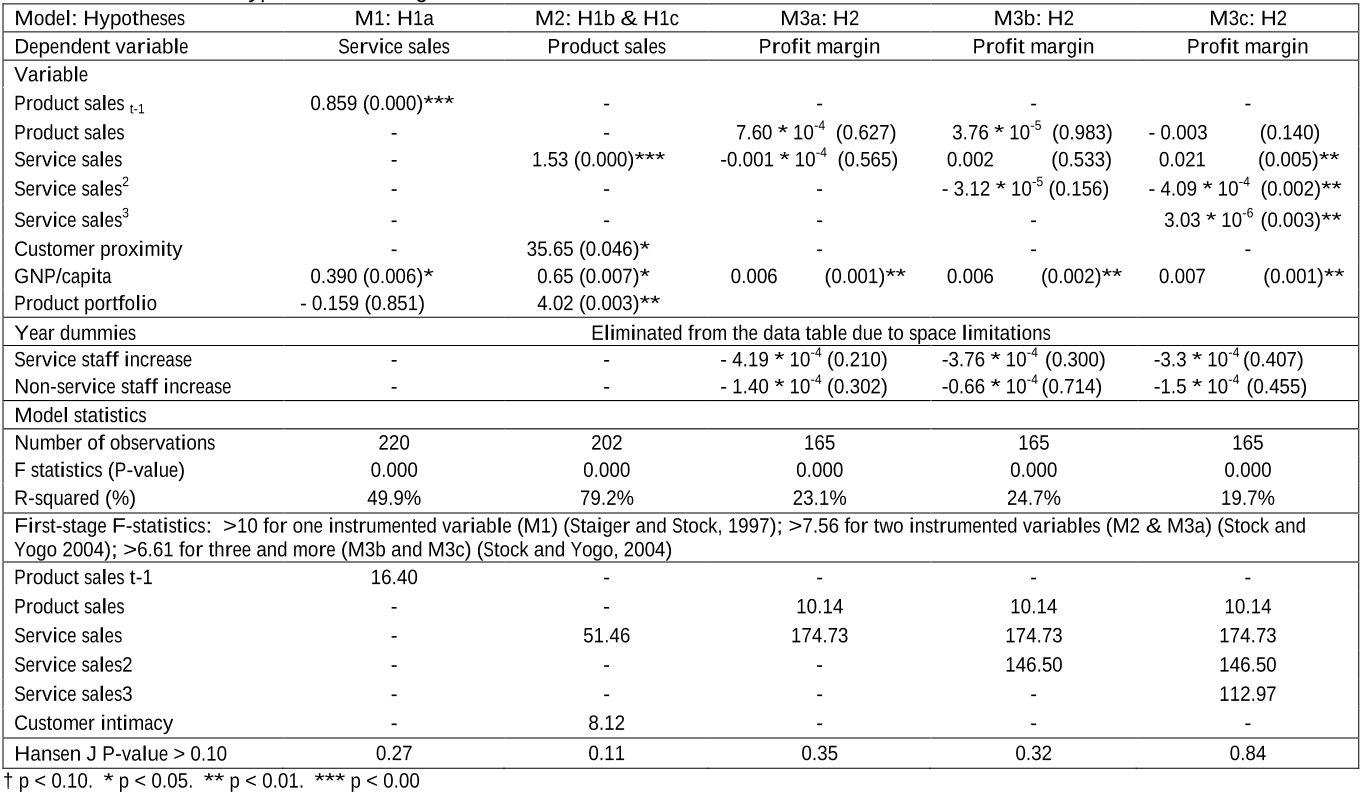Servitization: Disentangling the impact of service business model innovation on manufacturing firm performance
TLDR
In this paper, the authors analyzed the value creation and value appropriation processes of 44 national subsidiaries of a global manufacturing firm turned product-service provider, in the 2001-2007 period, and found that the firm under study is able to successfully transcend the inherent substitution of products by services and to enact complementary sales dynamics between the two activities.About:
This article is published in Journal of Operations Management.The article was published on 2013-05-01 and is currently open access. It has received 584 citations till now. The article focuses on the topics: Service (business) & Profitability index.read more
Figures

Table 3. Results from Hypotheses Testing 
Figure 1. Relationship between service scale and subsidiary profit margin* 
Table 1.a Overview of the variables and their use 
Table 1.a Overview of the variables and their use 
Table 2. Summary statistics and correlation coefficient No Variable Obs Mean SD Min Max 1 2 3 4 5 6 7 8 9 10 11 12 13 14
Citations
More filters
Journal ArticleDOI
Boosting servitization through digitization: Pathways and dynamic resource configurations for manufacturers
TL;DR: In this article, the importance of digital technologies for services in manufacturing has often been posited, but current literature has neglected to explain how companies can leverage digital methods to increase their service offering.
Journal ArticleDOI
Servitization, digitization and supply chain interdependency
Ferran Vendrell-Herrero,Oscar F. Bustinza,Glenn Parry,Nikolaos Georgantzis,Nikolaos Georgantzis +4 more
TL;DR: In this article, the authors empirically explored how digital disruption has affected Business-to-Business (B2B) interdependencies and proposed that upstream firms can still capture additional value through digital service if their servitized offer includes difficult to imitate elements.
Journal ArticleDOI
Business model innovation – state of the art and future challenges for the field
TL;DR: In this article, a role-based approach to categorize the literature and argue that the respective roles of explaining the business, running the business and developing the business can serve as three interrelated perspectives.
Journal ArticleDOI
Unlocking the Hidden Value of Concepts: A Cognitive Approach to Business Model Innovation
TL;DR: This work contributes to the cognitive perspective in strategy by analyzing business models as schemas that organize managerial understandings about the design of firms' value-creating activities and exchanges and theorizing how they can be innovated through processes for proactive schema change.
Journal ArticleDOI
Only the Brave: Product Innovation, Service Business Model Innovation, and Their Impact on Performance
TL;DR: In this paper, the authors examined the performance impact of two key service business models: the productoriented model and the customer-oriented model, implemented jointly with product innovation and found that the interplay between service business model innovation and product innovation results in long-term performance benefits coupled with a degree of short-term sacrifice.
References
More filters
Book ChapterDOI
Firm Resources and Sustained Competitive Advantage
TL;DR: In this article, the authors examined the link between firm resources and sustained competitive advantage and analyzed the potential of several firm resources for generating sustained competitive advantages, including value, rareness, imitability, and substitutability.
Book
Econometric Analysis of Cross Section and Panel Data
TL;DR: This is the essential companion to Jeffrey Wooldridge's widely-used graduate text Econometric Analysis of Cross Section and Panel Data (MIT Press, 2001).
Journal ArticleDOI
Dynamic capabilities and strategic management
TL;DR: The dynamic capabilities framework as mentioned in this paper analyzes the sources and methods of wealth creation and capture by private enterprise firms operating in environments of rapid technological change, and suggests that private wealth creation in regimes of rapid technology change depends in large measure on honing intemal technological, organizational, and managerial processes inside the firm.
Journal ArticleDOI
Some Tests of Specification for Panel Data: Monte Carlo Evidence and an Application to Employment Equations.
Manuel Arellano,Stephen Bond +1 more
TL;DR: In this article, the generalized method of moments (GMM) estimator optimally exploits all the linear moment restrictions that follow from the assumption of no serial correlation in the errors, in an equation which contains individual effects, lagged dependent variables and no strictly exogenous variables.
Related Papers (5)
Exploring the financial consequences of the servitization of manufacturing
Andy Neely,Andy Neely +1 more